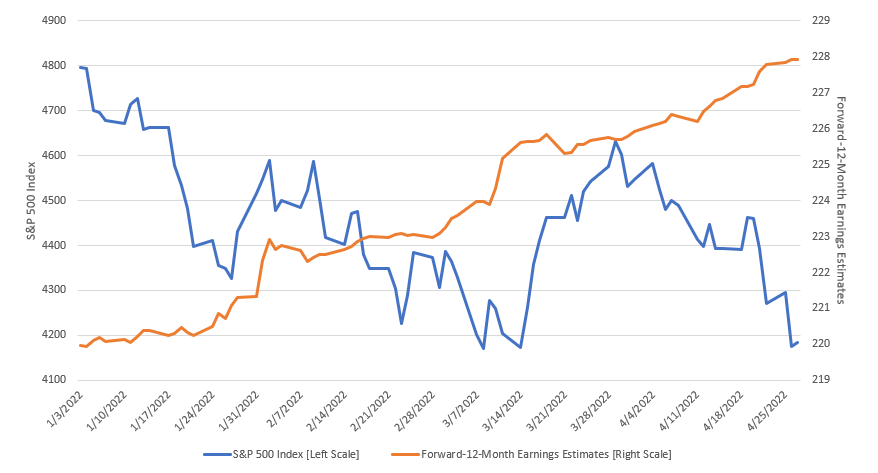We are entering the busiest days of 1Q reporting season for companies in the S&P 500 index. While only 212 companies have reported results over the last couple of weeks, another 228 will report before the end of next week, reaching a total of 88% of the S&P 500 index’s market capitalization. By that point, even thoughreporting season won’t officially close until early June, les jeux sont faits.
While it is still early at this stage to draw any conclusions, results released so far have been encouraging. Of the 212 companies that have already reported, 83% delivered a positive earnings surprise (i.e. earnings were above analysts’ estimates), which is above the 5-year average of 77%. On aggregate, even including companies that delivered a negative earnings surprise, earnings are coming in roughly 6% higher than analysts expected. However, as is usually the case, investors tend to discount past results and pay more attention to company guidance concerning expected future earnings, which are then incorporated into forward-looking analysts’ estimates. While a few companies made headlines for slashing their earnings outlook for future quarters, net guidance so far has been positive, and aggregate earnings estimate have continued to grind higher. In fact, forward-12-month earnings estimates have risen from below $220/share at the beginning of the year to over $228/share as of today. This has resulted in an interesting divergence, where earnings estimates have been rising at the same time as the S&P 500 index has been falling and is currently revisiting its lowest level for the year.
As we have pointed out in the past, stock prices can be volatile in the short term but tend to follow the directions of earnings in the long term. Current analysts’ estimates point to earnings growth to continue at a solid pace even beyond this year, reaching a level of over $250/share by next year. These numbers should be quite achievable barring an impending economic downturn, the odds of which remain quite low at the moment. As such, the widening disconnect between earnings and prices should be viewed as an opportunity to own stocks at a more attractive valuation.

Sauro Locatelli CFA, FRM™, SCR™
Director of Quantitative Research
Congress Wealth Management LLC (“Congress”) is a registered investment advisor with the U.S. Securities and Exchange Commission (“SEC”). Registration does not imply a certain level of skill or training. For additional information, please visit our website at congresswealth.com or visit the Investment Adviser Public Disclosure website at www.adviserinfo.sec.gov by searching with Congress’ CRD #310873.
This note is provided for informational purposes only. Congress believes this information to be accurate and reliable but does not warrant it as to completeness or accuracy. This note may include candid statements, opinions and/or forecasts, including those regarding investment strategies and economic and market conditions; however, there is no guarantee that such statements, opinions and/or forecasts will prove to be correct. All such expressions of opinions or forecasts are subject to change without notice. Any projections, targets or estimates are forward looking statements and are based on Congress’ research, analysis, and assumption. Due to rapidly changing market conditions and the complexity of investment decisions, supplemental information and other sources may be required to make informed investment decisions based on your individual investment objectives and suitability specifications. This note is not a complete analysis of all material facts respecting any issuer, industry or security or of your investment objectives, parameters, needs or financial situation, and therefore is not a sufficient basis alone on which to base an investment decision. Clients should seek financial advice regarding the appropriateness of investing in any security or investment strategy discussed or recommended in this note. No portion of this note is to be construed as a solicitation to buy or sell a security or the provision of personalized investment, tax or legal advice. Investing entails the risk of loss of principal.





Comments are closed.